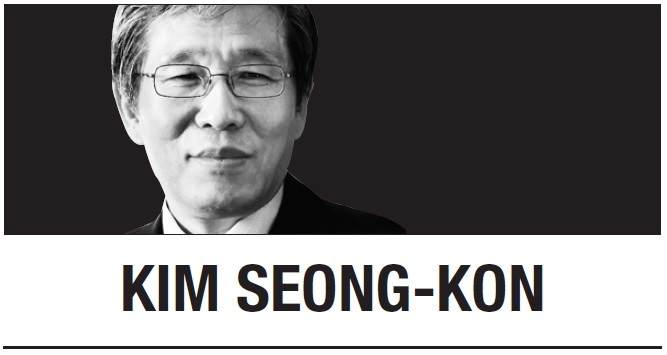[Kim Seong-kon] The Afghan incident and specialists on America
By Korea HeraldPublished : Sept. 1, 2021 - 05:30

Recently, Henry Kissinger wrote about why America “failed” in Afghanistan. Referring to his argument, the Korean press once again headlined, “Kissinger talked about why America was defeated in Afghanistan.” However, “failed” and “defeated” are two different words.
By pulling out its troops from Afghanistan, Washington sent a clear message to the world that America would not intervene in any country’s conflicts if the deployment of the US military would not serve America’s national interest and if US soldiers have to fight on behalf of a country’s army that is reluctant to fight its enemy. Of course, Biden is different from Trump and thus he is not seeking neo-isolationism. Instead, as Victor Cha and Michael J. Green have recently pointed out, Biden intends to strengthen America‘s foreign policy by not allowing its energy and power to be diverted from its main areas of concentration, namely, the Indo-Pacific region and the South China Sea.
In fact, during the 20 years of its involvement in the Afghanistan civil war, America spent an astronomical amount of money and endured heavy casualties. As a result, a majority of the American people have become weary of the war dragging on and on and have ardently supported America’s withdrawal from Afghanistan. In any event, Washington has accomplished its initial goal of killing Osama Bin Laden, the man responsible for ordering the attack on 9/11, who was hiding in Afghanistan.
The incident in Afghanistan reminds us of the withdrawal of the US troops from Vietnam about 50 years ago. At that time, Washington realized that the Vietnam War was a “quagmire” to America, so the deeper the US became involved in the Vietnam War, the deeper it would be stuck in the mud. Thus, America decided to withdraw its troops from Vietnam in 1973 and airlifted the remaining Americans in 1975 when Saigon fell into the hands of the North Vietnamese Army. In 2021, the same thing has happened again in a mountainous country called Afghanistan. It can also happen in other places in the future, if Washington thinks it is not worth it. That was precisely what we needed to perceive when we witnessed this recent incident in Afghanistan, not whether the US lost the war or not.
Unfortunately, the evacuation was not done in an orderly fashion. As a panicked crowd of Afghans rushed to the Kabul international airport to escape the imminent disaster, the situation turned chaotic and ugly. Obviously, Washington did not foresee the Taliban’s swift takeover. Although the American people supported the withdrawal from Afghanistan, they are disappointed by the “war’s chaotic end.” As a result, the Biden administration’s job approval rating dropped to 41 percent recently, according to USA Today.
Still, however, before criticizing Washington’s unpreparedness, we should ponder what would happen if Washington someday decided to pull out US troops from South Korea, which remains vulnerable to threats by North Korea. Washington has assured this would not happen in South Korea. Yet things can change, and we should prepare for the worst.
Although this recent evacuation was chaotic, it did not necessarily mean America’s defeat in the Afghanistan War. Rather, it simply means that whether Democrats or Republicans, the American people no longer want their country to assume the role of the international police, spending a lot of money and sacrificing young American lives overseas. The withdrawal of the US troops from Afghanistan exhibits such public sentiment. Indeed, America has changed considerably since 9/11.
We should know America comprehensively. American politicians, too, should know Korea accurately. Fortunately, America has a number of specialists on Korea, who are working at think tanks or teaching Korean studies at major American universities. Among others, the Council on Foreign Relations, the Center for Strategic and International Studies, the Brookings Institution, the Heritage Foundation, George Washington University and Georgetown University come to mind.
The Korean studies programs at major American universities could be a good resource for fostering experts on Korea. While recently teaching at the George Washington University and the University of California, Irvine, I came to know that the two universities have excellent Korean studies programs. Both universities have renowned specialists on Korea who are nurturing future experts. At GWU, the Korean studies program coordinates well with Chinese and Japanese studies, thereby creating an outstanding interdisciplinary East Asian studies department.
Both Seoul and Washington need to foster and utilize specialists on America and Korea. In this era of international crisis, what could be more important than understanding our precious allies?
Kim Seong-kon
Kim Seong-kon is a professor emeritus of English at Seoul National University and a visiting scholar at Dartmouth College. The views expressed here are his own. -- Ed.
-
Articles by Korea Herald







![[From the Scene] Monks, Buddhists hail return of remains of Buddhas](http://res.heraldm.com/phpwas/restmb_idxmake.php?idx=644&simg=/content/image/2024/04/19/20240419050617_0.jpg&u=20240419175937)








![[From the Scene] Monks, Buddhists hail return of remains of Buddhas](http://res.heraldm.com/phpwas/restmb_idxmake.php?idx=652&simg=/content/image/2024/04/19/20240419050617_0.jpg&u=20240419175937)

![[KH Explains] Hyundai's full hybrid edge to pay off amid slow transition to pure EVs](http://res.heraldm.com/phpwas/restmb_idxmake.php?idx=652&simg=/content/image/2024/04/18/20240418050645_0.jpg&u=20240419100350)

![[Today’s K-pop] Illit drops debut single remix](http://res.heraldm.com/phpwas/restmb_idxmake.php?idx=642&simg=/content/image/2024/04/19/20240419050612_0.jpg&u=)